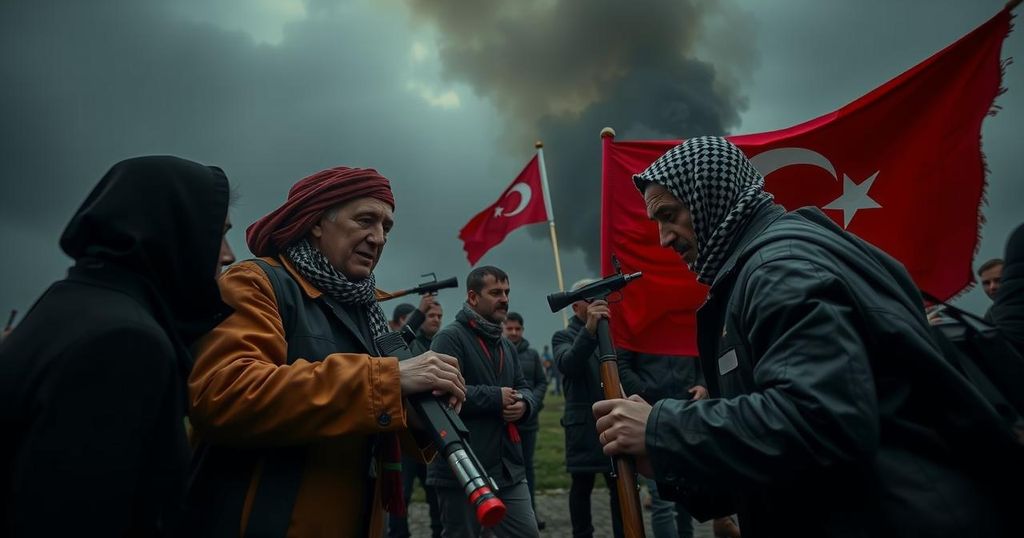Turkey’s Complex Approach Towards Kurdish Reconciliation Amidst Ongoing Conflict

Turkey is exploring potential dialogue with the Kurdish community following a deadly attack by PKK militants. This comes amid shifting regional dynamics and after unexpected statements from Turkish nationalist leader Devlet Bahceli, suggesting that imprisoned PKK leader Abdullah Ocalan could be allowed to address parliament. The PKK denied a link between the attack and Turkey’s policy shift, asserting it was a planned action meant to send a warning to the state. Despite military responses against Kurdish targets, some officials continue to advocate for peace, highlighting the complexities of reaching a resolution in the enduring conflict.
In a surprising development, Turkey is signaling a potential rapprochement with its Kurdish population following a deadly attack by the Kurdistan Workers’ Party (PKK) on a state-owned defense firm, TAI, resulting in five fatalities and twenty-two injuries. This shift comes just after Turkish nationalist and ally to the government, Devlet Bahceli, extended an unexpected olive branch to Abdullah Ocalan, the imprisoned PKK leader. Ocalan, incarcerated since 1999, was suggested by Bahceli to be allowed to address the Turkish parliament to renounce violence and advocate for the dissolution of the PKK. The PKK, in response to the attack, asserted through their Telegram channel that the incident was premeditated and unrelated to Turkey’s changing stance towards the Kurdish issue, describing it as a warning against Ankara’s alleged genocidal practices. In counteraction, the Turkish military launched strikes against Kurdish targets in northern Syria and Iraq. Hamit Bozarslan, a recognized authority on Kurdish affairs, posits that this alteration in Turkey’s position is influenced by growing destabilization in the Middle East, particularly concerning Iranian dynamics that also affect Iraq and Syria. The PKK, designated a terrorist organization by Turkey and its Western allies, has maintained a long-standing insurgency against the Turkish state since 1984, leading to significant loss of life. However, Bahceli, despite the recent attack, continues to advocate for peace, stating that it is an obligation for both Turks and Kurds to foster mutual affection. Additionally, Ocalan recently received a family visit — his first since 2020 — raising questions about his dwindling influence within the PKK after over two decades of solitary confinement. Analysts highlight the challenging position Ocalan finds himself in as he lacks organic contact with PKK leadership and faces skepticism about his capacity to steer a government-backed peaceful resolution. Moreover, Turkish public sentiment appears resistant to embracing negotiations with the PKK, seen as a reaction to the broader regional tensions exacerbated by the conflict between Israel and Hamas. Observers suggest that Turkey’s overtures towards Kurdish groups may be an attempt to bolster its internal stability in light of heightened conflict potential in the region, particularly concerning its borders with Syria, where Iran, an ally, holds sway. Turkey has decried Israel’s recent military actions, which the government claims have escalated regional hostilities.
The relationship between Turkey and its Kurdish population has long been marked by conflict, primarily due to the insurgency led by the PKK, which has fought for greater Kurdish autonomy. The Turkish government regards the PKK as a terrorist organization, leading to prolonged military confrontations and significant casualties on both sides. Recently, there have been discussions within Turkey about opening dialogue with the Kurds, reflecting a nuanced shift amidst changes in the geopolitical landscape of the Middle East, particularly involving neighboring Iran and the regional implications of the Israeli-Palestinian conflict. This background provides context for understanding Turkey’s recent overtures toward the Kurdish community despite the continuing challenges associated with the PKK. The complexity of these developments also involves Abdullah Ocalan, the imprisoned PKK leader, whose historical role in shepherding the Kurdish cause complicates efforts toward brokering peace. His recent family visit and the government’s willingness to engage in dialogue hint at a possible reconsideration of longstanding policies, motivated by regional instability and the need for Turkish unity in the wake of external threats. Consequently, public opinion in Turkey remains skeptical of reconciliation efforts, as many citizens remain wary of the PKK’s intentions and the potential implications of engaging with Kurdish groups in a peace process.
In conclusion, Turkey’s recent attempts to engage with the Kurdish community represent a significant shift in policy amidst regional upheaval. The implications of the deadly attack by the PKK on a state defense firm juxtaposed with the government’s outreach efforts reflect a complex dynamic involving historical grievances, ongoing conflict, and geopolitical considerations. While Abdullah Ocalan remains a critical figure within these discussions, the challenges of fostering genuine dialogue and garnering public support underscore the intricacies of any potential resolution to the long-standing Kurdish issue in Turkey. As the situation evolves, both the Turkish government and Kurdish factions will need to navigate a path fraught with hostility and differing expectations to achieve peace and stability in the region.
Original Source: www.iraqinews.com








